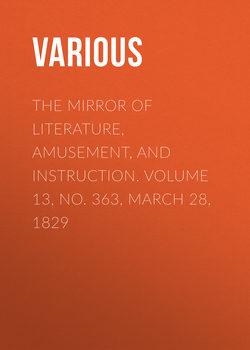The Mirror of Literature, Amusement, and Instruction. Volume 13, No. 363, March 28, 1829

Реклама. ООО «ЛитРес», ИНН: 7719571260.
Оглавление
Various. The Mirror of Literature, Amusement, and Instruction. Volume 13, No. 363, March 28, 1829
GUY'S CLIFF
ANCIENT CROSSES IN ENGLAND
TO R.H., ON HER DEPARTURE FOR LONDON
THE COURSE OF LOVE
I'LL BE AT YOUR BALL
RETROSPECTIVE GLEANINGS
POSTURE MASTERS
TO MAKE BUBBLE AND SQUEAK
ADVERTISEMENT
HONEST PREJUDICES,
SELECT BIOGRAPHY
MEMOIR OF BOLIVAR
LEDYARD TO HIS MISTRESS
ROMAN ALTAR
NOTES OF A READER
SUNSET
BEES
WAR
THE NEWSPAPERS
BEAUTY
PRE-AUX-CLERCS
LOVE
HUGONOTS
A ROUT
PLEASURE
GERMAN LIFE
THE HEIR
GAMING
THE NATURALIST
VOLCANIC ISLAND OF ST. CHRISTOPHER
MANNERS & CUSTOMS OF ALL NATIONS
ROYAL LIFE IN PERSIA
THE COSMOPOLITE
THE GATHERER
EPIGRAM
HUDSON AND HIS PIGS
ON A PERSON SAYING HE SPENT TOO MUCH TIME ON MUSIC
OLD PARR
THE MARCH OF INTELLECT
LONDON LEVELS
Отрывок из книги
Warwick—what olden glories and tales of other times are associated with this county. How many of its sites are connected with high-minded men and great and glorious actions. To the antiquary, the poet, and the philosopher, every foot is hallowed ground; and even the cold calculations of the commercial speculator treat with regard a county whose manufactures add to the stock of national wealth and importance. How many stories of love, war, and chivalry are told of its halls, castles, and monasteries, their lords and ladies and maidens of high birth. Kenilworth and Stratford—Leicester, Shakspeare and Warwick—like long trails of light, all flit before us in this retrospective dream of the days of "merry England."
Guy's Cliff is situated about one mile and a half north-east of Warwick. Here the river Avon winds through fertile meadows; and on its western bank, a combination of rock and wood, singularly picturesque, invited at an early period the reveries of superstitious seclusion and poetical fancy. It is supposed that here was an oratory, and a cell for the hermit, in Saxon times; and it is certain that a hermit dwelt in this lovely recess in the reigns of Edward III. and Henry IV. This is the spot to which the renowned Guy, Earl of Warwick, is said to have retired after his duel with the Danish Colbrond;1 and here his neglected countess, the fair Felicia, is reported to have interred his remains. It appears that Henry V. visited Guy's Cliff, and was so charmed with its natural beauties, and, probably, so much interested by the wild legend connected with the place, that he determined to found a chantry for two priests here. But war and an early death prevented the performance of this, among many other pious and benevolent intentions ascribed to the heroic Henry. Such a chantry was, however, founded in the first year of Henry VI. by Richard Beauchamp, Earl of Warwick; but the chapel and some contiguous buildings were not completed till after the earl's decease. In this delightful retreat lived John Rous, the antiquary, as a chantry priest.
.....
There are many stories told of the craft of the fox to compass his prey, of which Ol. Magnus hath many: such as feigning the bark of a dog to catch prey near the houses; feigning himself dead to catch such animals as come to feed upon him; laying his tail upon a wasp's nest and then rubbing it hard against a tree, thus catching the wasps so killed; ridding himself of fleas by gradually going into the water with a lock of wool in his mouth, and so driving the fleas up into it and then leaving it in the water; by catching crab fish with his tail, which he saith he himself was a witness of.—Derham's Physico-Theology, book iv. chap. 11., and Ol. Mag. Hist. lib. xviii. cap. 39, 40.—Peruse this ye incredulous lectors of Baron Munch-Hausen, and Colonel Nimrod. Talk no more of the fertile genius of our Yankee brethren, but candidly admit ye are blameworthy for withholding credence to matters which rather border on the marvellous.
Had man been a dwarf he could not have been a rational creature; for he must then have had a jolt head, so there would not have been body and blood enough to supply his brain with spirits, or he must have had a small head answerable to his body, and so there would not have been brain enough for his business.—Grew's Cosmol. Sacr. book i. chap. v.
.....